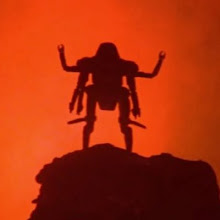Today is the first time that September 11 has fallen on a Tuesday since 2001. I struggled with whether to write a September 11 anniversary post today. This is not a site which offers political or social commentary, and it is vain, really, for me to assume that any view I have to espouse on the subject is any more worth reading than the myriad others that will be published today. But, in light of this day, I couldn't rightly write of some trivial pop culture artifact from years ago when something far more significant loomed for discussion. Considering that I will be preoccupied with the anniversary, I felt compelled to share at least some of my thoughts.
I can remember a time in the early 1990s when it was fashionable to say that Generation X (or whatever the newspaper writers and columnists were calling our age group at that time) had no event for which all of its members could remember where they were and what they were doing. (Baby Boomer writers often made this remark disdainfully, as if we should envy them for having such collective memories.). Inevitably, someone would invoke the Challenger explosion of January 28, 1986 as such an event for our generation. Really, though, that horrible accident seemed distinguishable from the violent and intentional assassination of President John F. Kennedy (the event which baby boomers would cite as their defining historical event and recount their very specific memories of). Today, those types of discussions seem, well, quaint and indicative of such a different time. Today such conversations would be silly.
On September 11, 2001, I myself saw nothing live on television. As the first plane crashed into the World Trade Center, I was at grad school, frantically preparing for a rather difficult 8:00 am CST class. Before class, I remember someone speaking very briefly about a plane and New York, but the assumption was accident and no details were known. That class had only just begun as the second plane crashed into second tower, and every person in the classroom was unaware of what was happening until 90 or so minutes later. We were, for all intents and purposes, in a brief state of suspended animation; as huge historical events unfolded, we were clueless, listening only to some lecture which would very shortly seem inane. Immediately after class, coming down the stairs to the first floor of the building, I ran into a friend who informed me that the World Trade Center buildings were, quite simply, "gone."
I had no idea what she was talking about.
I tried to access the Internet to learn a bit more about what had happened, but it was impossible. Websites were too slow; nothing was loading at the proper speed (as everyone around the word was simultaneously attempting the same task). There was no television in the the very new school building, either, so everyone huddled around a radio to listen to the news. Without television, without the Internet, without any sense of what the destruction looked like, it was as if we were hearing about December 7, 1941, another day which lives in infamy, in the days before anyone and everyone had a television set on which to rely for a visual account of such things. When I came home that afternoon, I had to retrieve my television from my closet, where I had placed it in an attempt to lessen my viewing and further my studies. I must have used the word "unbelievable" hundreds of times that awful day.
Recently, I read 102 Minutes: The Untold Story of the Fight to Survive Inside the Twin Towers. It is a frightful tale. At the title suggests, the book's authors, Jim Dwyer and Kevin Flynn, attempt to tell the story of September 11, 2001 - minute by minute - from the viewpoint of those trapped inside the World Trade Center towers. In the years since that terrible day, we've been inundated with the images of the planes crashing into the towers. These pictures are burned into our brains like no others in our lifetime. Yet, by their very nature, those images depict the perspective of an observer far from the upper floors of the towers and those within them. There hasn't been a significant source - at least one of which I've been aware - that has collected together the individual stories of those who were in the towers that morning.
This is that book.
Most affecting is the story of a young woman on the 98th floor of the first tower who was conversing with her husband by telephone about the pregnancy test she had taken only minutes before. It was the second such test she had taken that morning. While on the phone, the first plane flew directly into the 98th floor of that tower, no doubt killing her instantly. As the book observes, most on those floors could not have known what became of them. At that instant, her husband thought that she had simply dropped the receiver. They never spoke again.
In the second tower, there was a man who went from his very high floor down to the lobby only minutes after the plane crashed into the first tower. He was directed back upstairs by a guard. He returned to his floor in time to see the "U" on the side of the second plane just seconds before it crashed into the building. Such a perspective is almost unimaginable.
I've read books that adopt the minute-by-minute approach of tragic historical days. The Day Lincoln Was Shot, by Jim Bishop, tells of April 14, 1865, while The Death of A President, by William Manchester, does something similar for November 22, 1963. But those two books speak of the death of a single person - the leader of a nation. 102 Minutes relates the last fateful minutes of so many hundreds and hundreds and hundreds more - ordinary people with jobs to whom we, their fellow citizens, can far more easily relate. And that is why it is terrifying.
Some might find such a book sad, peculiar, or the result of a morbid fascination with a tragic historical event. These are awful accounts of many Americans' last minutes on this Earth. It is harrowing to read, but it is also compelling, because this is the real consequence of terrorism. The horror of those who tried and failed to escape from the building, as well as that of all of us who watched from afar, must be remembered. These days, we cavalierly say that important things must be kept in the public memory only to be distracted by the next fad or trend. But these are stories that must be told and retold, especially on this day.
Some commentators these days now scoff at the notion that September 11 "changed everything." Perhaps this is because our nation has returned to some level of normalcy; perhaps this is because we have not (yet) suffered a second such attack. Or, this may be a response to some politicians' invocation of September 11 as a justification for whatever program or measure they are at that moment supporting. Some things, maybe many things, do remain the same after that fateful and awful day, but the prism through which we view them was forever altered. The events of that day awoke a sleeping dragon, or Americans simply learned what citizens of another nations had learned long ago about international terrorism, or both. However, it is simply folly to say that September 11 changed everything, because it did.
Today, six years later, we'll see all the same footage again. Even after repeated viewings, it continues to shock and affect us all emotionally. I have watched historical footage of other tragedies and disasters, but I'm able to view it in a detached manner. But not this. Never this. it does not yet, and may never, seem like stuffy history from some dusty tome. We lived it. We continue to live, and we live now in a world shaped by it. Even six years later.





No comments:
Post a Comment